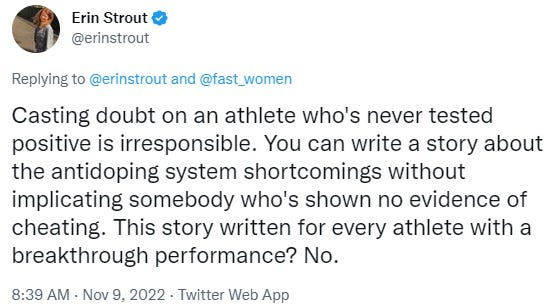Running's pundits are pissed at The NYT for committing a rare instance of skeptical journalism
The Kenyan winner of a corrupt marathon wasn't drug-tested in advance. Despite half of Kenya recently testing positive, the whiny waddlers want this to be a non-story
One of the putative jobs of journalism outlets is to expose systemic corruption—in politics, sports, education, and everywhere it’s found. The more people an instance of corruption affects, the more important it is for someone to report it out.
I say “putative” because this once-foundational concept of journalism has been destroyed in the past five to seven years. Journalists who write skeptically about major figures or institutions in 2022 are usually banned, slandered, or otherwise marginalized, whereas those who transmit rather than challenge examples of administrative corruption are rewarded.
Matthew Futterman wrote a story (most recent archived copy) for The New York Times about the winner of this year’s New York City Marathon, Sharon Lokedi, not having been included in the pre-race drug-testing pool. The article points out that this resulted from Lokedi, a Kenyan, being based for years in the United States:
Even though she attended Kansas and often lives and trains in Flagstaff, Ariz., Lokedi does not have to meet the same testing standards as American runners in the United States because she is a foreigner. The country an athlete competes for and the athletic federation that oversees her sport is largely responsible for her testing.
The story also references in multiple spots the recent spate of suspensions of Kenyan distance runners for triamcinolone, which is plainly, well, relevant.
As a result of those loopholes, the winner of the world’s largest marathon was able to run against women who were subjected to far more testing than she was at a time when antidoping authorities have been suspending Kenyan long-distance runners for using banned performance-enhancing drugs at an alarming clip. There is nothing to suggest that Lokedi violated antidoping rules.
If you have a brain in your head, you understand that the last sentence does the least amount of work in the whole paragraph—it’s there for administrative reasons only. That’s why Kyle Merber, who writes for Citius Mag and therefore has squandered whatever brainpower he once possessed, decided to pretend that this sentence is in fact the article’s money passage in responding to a predictable Twitter whine initiated by Alison Wade, a.k.a. Fast Women.
As you can see, Wade’s tweet is practically coherent.
Citius Mag gets money from Phil Knight, so none of the many dunces associated with this crippled half-Woke, half-pep rally multi-media project will ever be honest about doping and like Merber will pretend they have IQs of 65-67 to deny it. That’s really the whole story here. Lokedi competes for Under Armour’s Mission Run Dark Sky Distance team, not Nike, but that doesn’t matter.
Wade, like Citius Mag founder Chris Chavez, is a craven moron who blocks anyone smarter than her and who as a result is always addressing an audience of fellow idiots. Consequently, she’s rarely challenged on things like obviously trying to change the subject here by focusing on Lokedi’s alleged in-sport renown.
This is such an obvious red herring, just obvious—Wade herself even titled her most recent newsletter “Sharon Lokedi surprises in her marathon debut”—that it’s clear why Wade and the other moo-cows posing as journalists exclude sensible input: They’re embarrassed. They hate being schooled by people who can outthink them and who have integrity.
Moreover, people who report accurately on doping are a threat to those who have decided to erect careers around writing about professional running. Many of these people are keenly aware of the pervasiveness of doping, but others know absolutely nothing about high-level running at all despite at least immersing themselves in its wading pools.
As expected, perennial garbage-munchkin Erin Strout popped up in the thread to represent the kiddie-poolers and express precisely the opposite of what an actual journalist, or merely a person with a brain, would express.
This is from a Taylor Lorenz fan who thinks spreading unsupported accusations of abuse is fine, believes that canceling people for expressing contrary opinions is part of a life well lived, and knows nothing at all about competitive running other than whose world-class twats she wants to nuzzle (or to be more precise, I suppose, which twats between unusually fast legs she wants to bury her munchkin head within).
Strout doesn’t have the mental candlepower to recognize, say, a 30:16 10,000 meters as an outlier performance compared to even a 14:44 5,000 meters, and when she reads this sentence, she’ll have no idea, zero, why it’s even included. There are many dumb and degraded people involved in the creation of running content today, but Strout may be the worst offender in this cross-eyed, drool-bib-waving fogging-force of circular podcasters, white-male-bashers, and Instagram grifters.
Futterman’s crime, to Strout and other anti-integrity types, was being a real reporter and questioning an achievement by a woman, especially a woman of color. In other words, he reported the facts that the winner of the marathon wasn’t tested for almost a year and a half before the 2022 New York City Marathon, that she was an untested marathon runner from a country with a serious doping problem, and that Stephen Haas is her coach.
Unfortunately, Futterman failed to connect the name “Stephen Haas” to an actual drug scandal. Haas is, or was, Shelby Houlihan’s agent—that is, the guy who lied about Houlihan being injured last year when Houlihan was in fact already under suspension and hoping to weasel out of it before the ban became public knowledge.
Haas is skilled at maintaining high standing in the sport despite being associated with dirtbags and not supplying comments when comments are strongly called for. I actually had no special reason to think Lokedi was doping until I saw Stephen Haas’ name, but now it seems like a given. Fuck that piece of shit.
The profession of journalism now attracts suck-ups of lower-than-average intelligence rather than the intrepid disruptors that once ruled the arena. This is especially true in running, which using online chatter as a guide, now has as many pear-shaped, middle-aged former joggers massing resentfully at its border and lobbing their flaming turds over the wall as it does genuine participants. And with many of these already pliant dimwits being plied further with Phil Knight’s cash, the result is what you’d expect—a stream of lowing and mooing whenever a major outlet has the temerity to point out a loophole in a cheating-dominated sport.
Matthew Futterman is either the only person at The New York Times permitted to write stories that displease the deluded or the only one willing to subject himself to the inevitable blowback these stories generate. Most of what The NYT has excreted about running in recent years has been supplied by extreme liars and angry, lowing bovines like Lindsay Crouse, Jen A. Miller, and Talya Minsberg.
That Futterman is a man and has balls is probably not coincidence. But either way, one guy occasionally writing honest pieces for a compromised outlet so that a bunch of dumbasses can bitch about is not going to change a thing about how bad a joke running has become, largely because of the absence of Futtermans and how the few Futterman sorts still allowed to operate in the mainstream are treated by the squawking rabble for the crimes of being honest and writing readable material.





